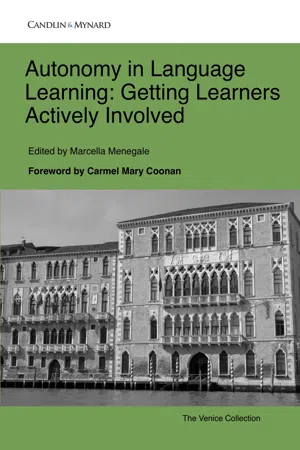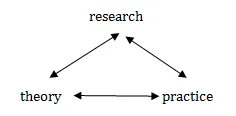
- English
- ePUB (mobile friendly)
- Available on iOS & Android
eBook - ePub
Autonomy in Language Learning: Getting Learners Actively Involved
About this book
The aim of this volume is to expand knowledge on research and action-research on language learner autonomy, conceivably inspiring further investigation into how students can be helped to be more actively involved in their own learning.
Tools to learn more effectively

Saving Books

Keyword Search

Annotating Text

Listen to it instead
Information
CHAPTER 1: Researching autonomous language learning: Issues and some findings
Lienhard Legenhausen
University of Münster, Germany
Abstract
The principles of learner-centred approaches in foreign language classes are widely accepted by researchers and practitioners alike. However, when it comes to practical issues of implementing these principles systematically, for example, in the autonomous classroom, then a host of skeptical voices can be heard. The article stresses the need for empirical research which can illustrate the linguistic outcomes of learners acquiring the foreign language in an autonomous learning environment. After outlining the general state of play as regards autonomous language learning and research, the article will first present some results from a research project focusing on the linguistic development of autonomous learners. Secondly, I will draw attention to the close affinity between autonomous learning and teacher-initiated action research, which might indicate a way for future action.
Keywords
Action research, learner autonomy, linguistic outcomes, grammatical competence, theory construction, work cycle
1. Introductory remarks
When it comes to autonomous language learning there are a host of open questions that await some more definite answers. They have to do not only with theory construction, and the various forms of implementation of autonomous principles in practice, but also with questions such as:
• Why have principles of autonomous language learning not reached classrooms on a wider scale?
• How can the quality of learning in autonomous classrooms be described in more explicit terms?
• How do learning results compare to those in other – more traditional – contexts?
Summarizing the state of affairs, David Little comes to the conclusion:
Very little research has focused explicitly on the relation between learner autonomy, the processes of learning, and the development of proficiency in the target language (Little 2008: 39).
Small wonder then that the acceptability of autonomous language learning by stakeholders meets with reservations. It is especially empirical evidence of successful practices that could, for example, counter sceptical voices of practitioners and others who often find the ideas appealing if not fascinating, but, for various reasons, not actually feasible in their own teaching contexts. So what we need is, on the one hand, more hard and reliable research results that convincingly demonstrate that autonomous language learning is a highly successful way of going about the learning/teaching undertaking. On the other hand, we must also find ways of getting teachers involved in these research questions and illustrate ways in which they can move their teaching practices towards more autonomy. It is here that the concept of action research seems the most promising option.
2. Research and the autonomous classroom: The state of play
As is well-known, research stands in a reciprocal relationship to theory construction, on the one hand, and practice, on the other. Theory construction is one of the aims of research, but at the same time, any research approach is also theory-laden. The ultimate aim of both theory and research is to improve control of practical issues, which means improving practice. Thus, research, theory and practice can be said to stand in a triangular relationship in which each has an impact on and is influenced by the other two constructs (cf. Figure 1).

Figure 1: Research-Theory-Practice: a triangular relationship
The field of learner autonomy, however, is not without problems in all three components of the triangle. As regards theory construction, Rebecca Oxford has stated that ‘that the theoretical framework of learner autonomy […] is far from coherent’ (Oxford 2003: 75). She herself claims to have come up with a more ‘systematic model of L2 learner autonomy’, and she suggests four perspectives on autonomy:
• A technical perspective (focus on the physical situation => cf. self-access centres)
• A psychological perspective (focus on the learner)
• A sociocultural perspective (focus on mediated learning, i.e. social interactions)
• A political-critical perspective (focus on ideologies, power and access to power; cf. emancipatory)
These ‘perspectives’ – if they are intended to form a more systematic model of learner autonomy, that is – lack one essential ingredient of a model: the interrelationships between the various components are not indicated.
Many researchers believe, for example, that the psychological dimension is m...
Table of contents
- Table of Contents
- Notes on Contributors
- Foreword by Carmel Mary Coonan
- Preface and Acknowledgements by Marcella Menegale
- Notes on the 2019 Edition of the Book
- Introduction by Marcella Menegale
- SECTION ONE: Researching Language Learner Autonomy
- CHAPTER 1: Researching autonomous language learning: Issues and some findings
- CHAPTER 2: Exploring autonomous learning: A teacher’s experience and learners' perceptions
- CHAPTER 3: Action research based on fostering learner autonomy principles in English classes of the Czech secondary school
- CHAPTER 4: Turning input into intake: Autonomous reading and its impact on writing
- CHAPTER 5: Developing autonomy in EFL learning and teaching: A portfolio program under collaborative and reflective supervision
- CHAPTER 6: Developing learner autonomy: From theory to classroom practice
- CHAPTER 7: Developing autonomous language learners: The roles of learning strategies and differentiated instruction
- CHAPTER 8: Intercultural communication strategies for learner autonomy
- CHAPTER 9: Learner autonomy in a multicultural Middle Eastern context: A curricular interpretation
- CHAPTER 10: Tools to develop learner autonomy: A Vygotskian perspective on the language learning process
- CHAPTER 11: Scaffolding autonomous competence in the ESP tertiary classroom: An analysis of learners' perceived effects
- CHAPTER 12: Students' portfolios to foster autonomy in translation learning
- CHAPTER 13: Developing advanced language learners' autonomy in blended learning
- CHAPTER 14: Feedback, evaluation and grading in the autonomous foreign language classroom. An overview based on a teacher's experiences
- CHAPTER 15: Re-defining the learning space: Advising tools in the classroom
- CHAPTER 16: A study on knowledge transfer between in and out-of-school language learning
- CHAPTER 17: Smart (and autonomous) as a phone? Mobile language learning testbed through two trials within the European SIMOLA project
- Publication Information
- Autonomous Language Learning Series
Frequently asked questions
Yes, you can cancel anytime from the Subscription tab in your account settings on the Perlego website. Your subscription will stay active until the end of your current billing period. Learn how to cancel your subscription
No, books cannot be downloaded as external files, such as PDFs, for use outside of Perlego. However, you can download books within the Perlego app for offline reading on mobile or tablet. Learn how to download books offline
Perlego offers two plans: Essential and Complete
- Essential is ideal for learners and professionals who enjoy exploring a wide range of subjects. Access the Essential Library with 800,000+ trusted titles and best-sellers across business, personal growth, and the humanities. Includes unlimited reading time and Standard Read Aloud voice.
- Complete: Perfect for advanced learners and researchers needing full, unrestricted access. Unlock 1.4M+ books across hundreds of subjects, including academic and specialized titles. The Complete Plan also includes advanced features like Premium Read Aloud and Research Assistant.
We are an online textbook subscription service, where you can get access to an entire online library for less than the price of a single book per month. With over 1 million books across 990+ topics, we’ve got you covered! Learn about our mission
Look out for the read-aloud symbol on your next book to see if you can listen to it. The read-aloud tool reads text aloud for you, highlighting the text as it is being read. You can pause it, speed it up and slow it down. Learn more about Read Aloud
Yes! You can use the Perlego app on both iOS and Android devices to read anytime, anywhere — even offline. Perfect for commutes or when you’re on the go.
Please note we cannot support devices running on iOS 13 and Android 7 or earlier. Learn more about using the app
Please note we cannot support devices running on iOS 13 and Android 7 or earlier. Learn more about using the app
Yes, you can access Autonomy in Language Learning: Getting Learners Actively Involved by Marcella Menegale in PDF and/or ePUB format, as well as other popular books in Education & Teaching Languages. We have over one million books available in our catalogue for you to explore.